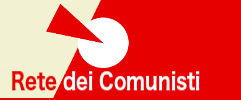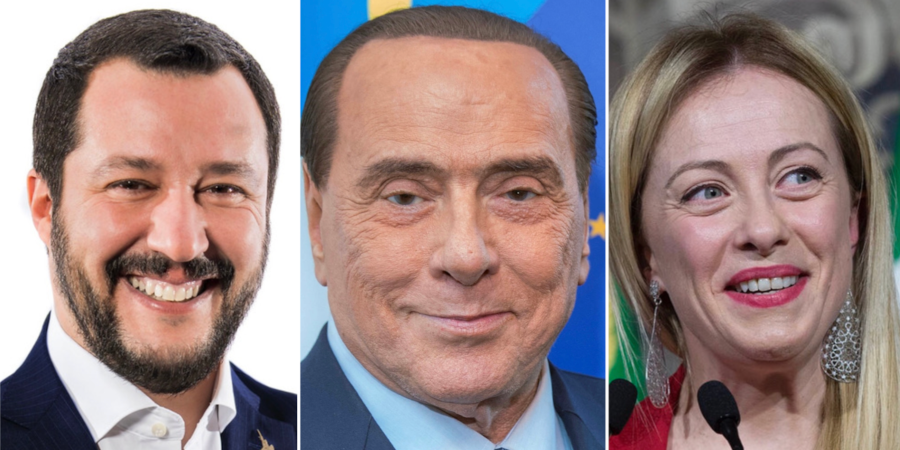| english | español | français | italiano
Mauro Casadio – Rete dei Comunisti
Today Meloni reaches 26% of the vote, yesterday it was Salvini’s turn to sing victory, before that it was Grillo and before that Renzi, not to mention Berlusconi in his time. All these ‘victors’, excluding for now only the latest arrival, have inexorably plunged from the stars to the stalls.
This cyclical trend of the Italian political system, which has now become evident, is certainly not accidental, but reflects a hegemonic difficulty of the ruling classes who resort to instruments ranging from political alarm – with the decisive support of the information system – to the exaltation of the saviour of the country, from Monti to Draghi, in order to revive the fortunes of ‘Made in Italy’; naturally making the subaltern classes pay for it and preparing them for a new ‘populist’, ‘sovereignist’, ‘pro-fascist’ and so on.
Of course, this situation is not the product of ‘conspiracies’. but a skilful way of managing real political contradictions, once the ‘communist danger’ has been overcome, turning them in favour of the ruling classes; a way that has been built and field-tested since the 1990s by the ‘think tank’ of the La Repubblica publishing group and its founder Eugenio Scalfari.
We are now at a new stage of national political pathology where the fascist danger would be directly on the doorstep, as demonstrated by the Missina flame on the symbol of ‘Fratelli d’Italia’, and we will probably witness in the coming months appeals, mobilisations, representations managed by those who have cultivated and prepared for this danger.
Perhaps sending the CGIL or the PD’s collateral associationism ahead, with an ‘antagonistic’ left in tow, but subordinate to the calls of movementism.
Obviously the party responsible for all this is the Democratic Party, which, despite systematically losing every election since 2008, excluding the 2014 European elections with Renzi, still manages to play a governmental role that is detrimental to the country but certainly not to the big business groups, finance, the European Union, and NATO.
Further evidence of this can be seen in both the growing tendency towards abstentionism produced by shameless transformist politics, and the blunder taken by Letta on the M5S which, by ‘expelling’ it from the wide field, has brought it to new life.
Moreover, in the PD there is a habit of burning its leaders for internal hyper-competition and in order to continue to have a function as a third-party ‘controller’ over the national political system.
What is certain is that this function, faced with yet another electoral defeat, risks leading to its disintegration after losing Bersani, Renzi, Calenda and many others.
It is certainly not possible to make predictions in this sense, but the prospect of the French PS, now reduced to a lumino, is now a real possibility even for this nest of vipers.
But let us come to the question posed by the electoral passage, namely that a party that is the direct heir of Almirante’s MSI wins the elections and aspires to the presidency of the council.
There is no doubt that this organisation has retained its MSI DNA, nor does it try to hide it too much when its leaders and militants do the Roman salute, or celebrate some of their anniversaries, or when they spew racist phrases classic to their reactionary repertoire. Obviously they consider it an element of identity, valuing it as useful for their strengthening.
Unfortunately, we must also take note of the ‘overtaking’ made by Meloni, with around 27% of the women’s vote, over the PD feminists who talk a lot but then show themselves incapable of changing the political leadership of the party, feminist in words but male chauvinist in fact.
The harshest possible response must be given to the most reactionary aspects that emerge with mobilisation and struggle, preventing the future government from hiding behind a phoney democratising make-up.
But neo-fascists must also come to terms with the reality that today means war, economic and social crisis, but above all respect for the dictates of the European Union.
On the other hand, any fascism has never asserted itself without the complicity of the big bourgeoisie, which today instead likes to represent itself in a soft, ‘democratic’ manner, defending rights, the environment and the whole ideological repertoire that is daily paraded to us in the mass media.
So the right-wing government will have to face and manage a harsh phase of social and economic regression by betraying its rhetoric against big business, finance and even the European Union; and we can already see the first symptoms of this reconversion.
In the press conference on the election result, Meloni said that the ‘hour of responsibility’ has come, she is reassuring Draghi and the European elite by proposing to write the next financial law in four hands with the outgoing prime minister, and, as a first proof, she intends to keep her commitment to eliminate the citizenship income in obedience to EU rules on budgetary rigour.
Paradoxically, we are facing a reversal of the political functions of the left and the right in recent decades. In the 1990s and up to the 2006 elections, it was the centre-left that took charge of austerity policies, hitting and economically and socially regressing its electoral base.
Today it is precisely this ‘anti-system’ right wing that must take on the system’s interests if it wants to remain in government, otherwise it is ready for the ‘rough’ treatment already implemented with Berlusconi in 2011, as announced by Von Der Leyen, president of the European Commission.
In short, we are probably facing a film we have seen many times before, where the electoral winner becomes the sacrificial victim of the EU’s anti-grassroots, now also warmongering policies.
To seal this, there has already been Meloni’s 180° turn, supporting NATO and Euro-Atlantic imperialist policies, in stark contrast to when she sympathised with Russia and Putin, as her allies the League and Berlusconi continue to do in some ways, trying not to appear too turncoat.
If we consider that this is what the national political picture will be, we cannot fail to assess the results obtained by the list to which we gave our political and organisational support as RdC, namely the People’s Union.
The 1.5 per cent result certainly has its reasons in the way the Unione Popolare was literally dragged into the electoral agon, practically in the days following its first political assembly, on 9 July, thinking it could count on a period of a few months to define a political project that had its own credibility, structuring and social roots.
The crisis of the ‘unsinkable’ Draghi government, Mattarella’s choice to go straight to elections and the summer period forced us into a tour de force that nonetheless allowed for electoral participation and an inadequate result, but which demonstrated, even with a dynamic and articulate election campaign, a reality present in the country.
However, once the electoral storm has passed, it is essential to return to reflection in order to define well the objectives for building a political representation of penalised social sectors, hence the organised character that the Popular Union itself must assume, and also the process to be followed to transform words into deeds, with a complex path that unfortunately does not lend itself to simplifications.
We must be clear about the dimension of the issue that we are now about to tackle, relating to the condition of the subaltern classes in our country; subaltern not only as a material condition but above all on an ideological level, with the politically devastating effects that we can verify at every electoral passage.
For us, the electoral result obtained had a positive function with the promotion of a moment and a collective path, which however is only the presupposition of a possibility, of a potentiality, all to be built.
In fact, we cannot fail to make an objective assessment of the quantitative data achieved by the list, which slightly exceeds – around 30,000 more votes – that obtained by Potere al Popolo in 2018, that is, in a condition very similar to the current one, with the convergence of the PRC.
In short, if the subjective charge has been positively amplified, what is different is finding the way beyond what is the narrow, albeit important, sphere of the most radical left present in the country, but to date absolutely insufficient to open up broader perspectives.
The point once again is a strong social rooting, organised mass relations in the world of work and among young people, and above all militants working on this objective, since a society turned in on itself does not spontaneously express conscious opposition, but only passive anger and without prospects, as we have seen too many times in recent years.
This possibility stems from the realisation of the prospects that will materialise in the coming months and years with the structural and long-term nature of the crisis that has already opened with the pandemic.
This will affect the purely economic data, from inflation to wages, to precariousness; the political ones, with a democratic stranglehold already initiated by Draghi and Mattarella; and above all, the era of war into which we are moving.
Faced with the systemic crisis, classical political tactics are not enough, where political positioning on events is the main practice and prevails over planning, we must realise that what is missing is the building of strength, of political organisation rooted in society.
To respond to the need to change power relations, and not limit oneself to mere representation, certain elements must be explicitly stated in the perspective to be constructed.
The first is to present itself as a force that clearly aims at overcoming the current capitalist social order towards another social model linked to the socialist perspective. Identity is not something that should be hidden, on the other hand we have FdI which has in its symbol the history of the Missina and therefore to lower its identity simply means disappearing into the mainstream.
The other is that of organisation, which is never a question of organisation, in the sense that it is a process of construction over time that must take note of the reality from which it starts.
UP is made up of different forces, more or less organised, which must find a way to synthesise patiently and in a very complex situation where accelerations are counterproductive.
In the DNA of the People’s Union there must be the construction of a mass relationship with social sectors that is not episodic but projectual, with the capacity to promote general movements of struggle and outside the political and trade union apparatuses that have brought us to this point.
In short, as they say in these cases, to work and struggle.
CREDITS
Immagine in evidenza: Salvini Berlusconi Meloni 2018
Autore: Nick.mon; 23 ottobre 2021
Licenza: Creative Commons Attribution 4.0 International;
Immagine originale ridimensionata e ritagliata

